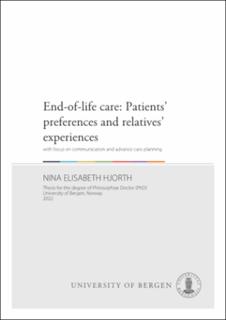End-of-life care: Patients’ preferences and relatives’ experiences : with focus on communication and advance care planning
Doctoral thesis

Åpne
Permanent lenke
https://hdl.handle.net/11250/2996437Utgivelsesdato
2022-06-10Metadata
Vis full innførselSamlinger
Sammendrag
Background and aim: Advance care planning (ACP) is a communication process for mapping patients’ priorities for end-of-life care. Preparing for an introduction of ACP in Norwegian hospitals, we wanted to explore patients’ views on ACP and which topics they wanted to discuss, and how patients, relatives and clinicians experienced ACP conversations. Finally, we wanted to explore whether an invitation to ACP would influence perceptions about care and support among bereaved relatives.
Methods: Focus group interviews (2014-15) were conducted with patients having advanced pulmonary diseases. Based on the results, a semi structured ACP conversation guide was developed. Individual ACP conversations were held with hospital inpatients in an ACP implementation pilot (2014–2017). Clinicians’ views on ACP were explored in focus group interviews. Responses to the post-bereavement survey of the ERANet-LAC International Care of the Dying Evaluation (CODE) project (2017-2020) in Argentina and Norway were studied to examine any associations between being offered an ACP conversation and perceptions about care and support. Transcribed focus group interviews and ACP documents were analysed by systematic text condensation, the survey results by descriptive statistics and mixed-effects ordinal regression models.
Results: Focus group patients (13) called for support, information and transparency, and they preferred an invitation to an ACP conversation at certain “turning points” in the disease trajectory. Both the invitation and the conversation itself should be patient-centred and individually tailored. In the pilot, 51 patients with advanced lung disease took part in ACP conversations; relatives participated in 18 of them. All participants appreciated the conversations. Four themes emerged: (i) disturbing symptoms, (ii) existential topics, (iii) care planning, and (iv) important relationships. Clinicians acted as gatekeepers for participation, but the documentation of the conversations revealed information previously unknown to clinicians. Many of them saw ACP as pertinent, and called for implementation resources. The post-bereavement survey had 276 participants (Argentina: 98). Fifty-six percent had been invited to ACP conversations, and their perceptions about care and support were significantly more positive than those of the not-invited; in the latter group a majority (68%) would have wanted an invitation to an ACP conversation.
Conclusion: ACP should be offered, with a patient-centred approach, at turning points in the disease trajectory. An attention towards present and future symptom control may be useful. ACP may support patients and relatives by responding to their needs, whether emotional or practical, and providing tailored information. Important aspects for implementing ACP are management support, education, training, feasible routines and allocated time to perform the conversations, as well as safe and easily retrievable documentation and sharing of this between healthcare levels. Bakgrunn: Forhåndssamtaler er en kommunikasjonsprosess for å kartlegge pasienters prioriteringer for behandling, omsorg og pleie i livets sluttfase. Før introduksjon av forhåndssamtaler i norske sykehus, ønsket vi å utforske pasienters synspunkter på forhåndssamtaler, hvilke tema de ønsket å ta opp, og hvordan samtalene ble opplevd av pasienter, pårørende og helsepersonell. I tillegg ønsket vi å undersøke om forhåndssamtaler påvirket etterlattes oppfatninger om behandling og støtte i pasientens siste levedøgn.
Metode: Fokusgruppeintervjuer (Studie I: 2014-15) ble gjennomført med pasienter med langtkommet, livstruende lungesykdom. Basert på resultatene utviklet vi en semi-strukturert samtaleveileder som ble benyttet i 51 forhåndssamtaler med pasienter innlagt i sykehus (Studie II: Pilotstudie 2014-17). Helsepersonells erfaringer med prosjektet ble undersøkt i fokusgruppeintervjuer. Svar fra en spørreundersøkelse blant etterlatte i Argentina og Norge som ledd i prosjektet ERANet-LAC International Care of the Dying Evaluation (CODE) (Studie III: 2017-2020) ble undersøkt med tanke på effekter av forhåndssamtaler. Transkriberte fokusgruppeintervju og dokumentasjon av forhåndssamtaler ble analysert med systematisk tekstkondensering, resultater fra spørreundersøkelsen med deskriptiv statistikk og ordinale regresjonsmodeller for blandete effekter.
Resultat: Fokusgruppedeltakerne ba om støtte, informasjon og åpenhet, og ønsket tilbud om forhåndssamtale ved ulike vendepunkt i sykdomsforløpet. Både invitasjonen og selve samtalen måtte være pasientsentrert og individuelt tilpasset. Femtien forhåndssamtaler ble gjennomført med pasienter, hvorav 18 med også pårørende til stede. Alle deltakerne satte pris på samtalene. Fire tema ble avdekket: (i) Plagsomme symptomer, (ii) eksistensielle tema, (iii) planlegging av behandling, pleie og omsorg og (iv) viktige relasjoner. Helsepersonell opptrådte som portvoktere for deltakelse, men verdsatte samtalereferatene hvor de fant nye opplysninger. Mange vurderte forhåndssamtaler som nyttige og etterspurte ressurser for implementering. Etterlatte-undersøkelsen hadde 276 deltakere (Argentina 98). Femtiseks prosent hadde blitt invitert til forhåndssamtale, og deres inntrykk av behandling, pleie og støtte var signifikant mer positive enn hos de som ikke hadde blitt invitert; i den siste gruppen hadde flesteparten (68%) ønsket å bli tilbudt en forhåndssamtale.
Konklusjon: Forhåndssamtaler bør ha en pasientsentrert tilnærming og tilbys ved vendepunkt i sykdomsforløpet. Oppmerksomhet mot lindring av nåværende og fremtidige symptomer kan være en nyttig innfallsvinkel. Ved å respondere på pasientenes behov, emosjonelle eller praktiske, og gi individuelt tilpasset informasjon, kan forhåndssamtaler bidra til å støtte pasienter og pårørende. Viktige punkter for implementering av forhåndssamtaler er ledelsesforankring, undervisning og opplæring, gjennomførbare rutiner og tid til å gjennomføre samtalene, samt oversiktlig og trygg dokumentasjon og deling av informasjon på tvers av nivåer i helsetjenesten.
Består av
Paper 1: Hjorth NE, Haugen DF, Schaufel MA. Advance care planning in lifethreatening pulmonary disease: a focus group study. ERJ Open Res 2018; 4(2):00101- 2017. The article is available at: https://hdl.handle.net/11250/2996686Paper 2: Hjorth NE, Schaufel MA, Sigurdardottir KR, Haugen DF. Feasibility and acceptability of introducing advance care planning on a thoracic medicine inpatient ward: an exploratory mixed method study. BMJ Open Respir Res 2020; 7(1):e000485. The article is available at: https://hdl.handle.net/11250/2737283
Paper 3: Hjorth NE, Hufthammer KO, Sigurdardottir K, Tripodoro VA, Goldraij G, Kvikstad A, Haugen DF, on behalf of the ERANet-LAC CODE project group. Hospital care for the dying patient with cancer: does an advance care planning invitation influence bereaved relatives’ experiences? A two country survey. BMJ Support Palliat Care 2023; 13(e3):e1038–e1047. The article is available at: https://hdl.handle.net/11250/2894212
